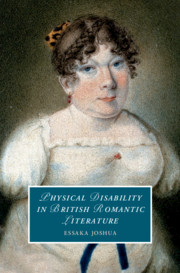
In the last thirty years, the field of disability studies has fully emerged, bringing a new vocabulary for understanding disability, that grew out of, and continues to grow with, the disability rights movements and people’s experiences of disability. Back in the ’90s, I found reading Lennard Davis’s book Enforcing Normalcy (1995), truly transformational. Davis’s way of thinking about normative behaviour in relation to bodies and minds fundamentally changed my way of reading.
Although we often think of disability as a biological reality, ‘disability’ is a group term whose meaning undergoes complex shifts and variations. As such, determining who is and who is not part of this group is part of intellectual and cultural history. For me, studying disability in the literature of the late eighteenth and early nineteenth centuries means acknowledging that our modern ideas of disability are different from those that we find in history. ‘Disability’ is a term that was not used in the way we use it today. Studying literary texts using disability studies — whether or not the texts place at their centre bodily and mental impairment — means figuring out the concepts of ability and disability that are at work in them. Disability studies invites us to engage in a fuller understanding and appreciation of exclusionary social structures, prejudices, and actions. It requires us to think of ability as a politicized concept.
My aim with Physical Disability in British Romantic Literature is to put a spotlight on the ability/disability discourse in Romantic-era writing. Given that this period ignited the civil rights movement that ultimately led to disability rights becoming law in many countries, it is important that we review the period’s understanding of equality. Unsurprisingly, the egalitarian thinking of the period, which we see in much of the literature, begins with the able-bodied and able-minded, conceived as the universal citizen. This may go some way to explaining why it took so long for disability to become a civil rights issue. Scholars and students are used to studying romanticism in the context of some important enfranchisement issues: in particular, voting, women’s equality, improved working conditions, colonialism, and the abolition of slavery. But we have been less cognizant of the questions of ability that saturate these topics. I attempt to redress some of the imbalance.

Header photo courtesy of dennisflarsen @pixabay
Latest Comments
Have your say!